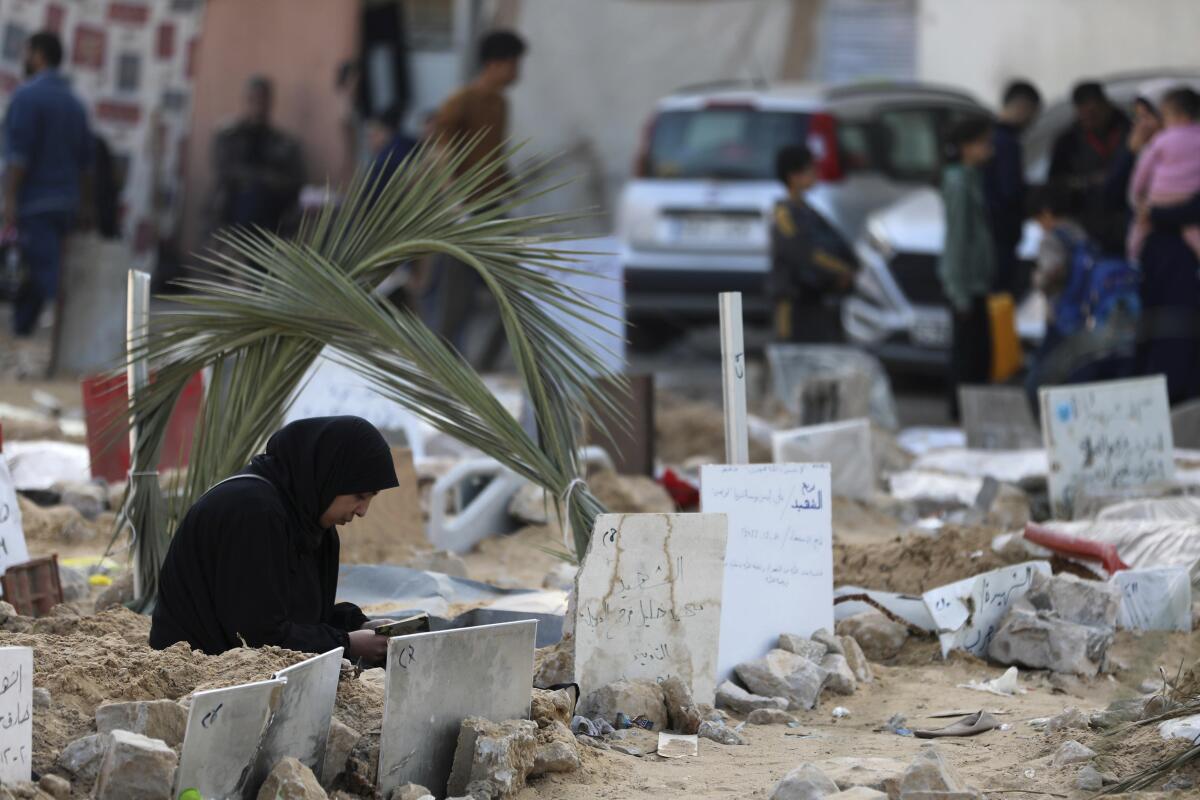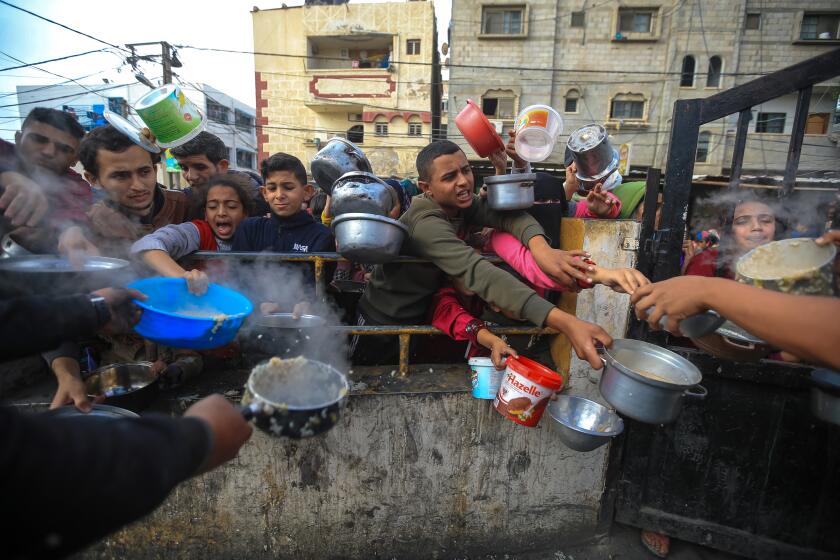Israeli strikes in central Gaza kill at least 35 as fighting rages

- Share via
DEIR AL BALAH, Gaza Strip — Israeli strikes in central Gaza killed at least 35 people Sunday, hospital officials said, as fighting raged across the tiny enclave a day after Israel’s prime minister said the war will continue for “many more months,” resisting international calls for a cease-fire.
The military said Israeli forces were operating in Gaza’s second-largest city, Khan Yunis, and residents reported strikes in the central region, the latest focus of the nearly three-month air and ground war that has now engulfed most of the territory.
The war has raised fears of a broader regional conflagration. The U.S. military said Sunday that its forces shot and killed several Iran-backed Houthi rebels when they tried to attack a cargo ship in the Red Sea, an escalation in a maritime conflict linked to the war in Gaza.
Israel says it wants to destroy Hamas’ governing and military capabilities in Gaza, from where it launched its Oct. 7 attack on southern Israel. The militants killed some 1,200 people and took 240 others hostage after breaking through Israel’s border defenses, shattering its sense of security.
More than 21,800 Palestinians have been killed and 55,000 others wounded in Israel’s subsequent air and ground offensive, according to the Health Ministry in Hamas-ruled Gaza. The war has sparked a humanitarian crisis, with a quarter of Gaza residents facing starvation, according to the United Nations. Israel’s bombardments have leveled vast swaths of the territory, making parts uninhabitable and displacing some 85% of Gaza’s 2.3 million residents.
U.N. and other agencies sound alarm over ‘acute food insecurity’ in Gaza. One in 4 Palestinian households is facing extreme hunger.
Just after midnight on New Year’s Day, Hamas militants fired a barrage of rockets, setting off air raid sirens in southern and central Israel. No injuries were reported.
Displaced Palestinians found little to celebrate on New Year’s Eve in Muwasi, a makeshift camp in a mostly undeveloped area of southern Gaza’s Mediterranean coast designated by Israel as a safe zone. “From the intensity of the pain we live, we do not feel that there is a new year,” said Kamal al-Zeinaty, huddled with his family around a fire inside a tent.
Israel expanded its offensive to central Gaza in the last week, targeting a belt of dense, built-up communities that house refugees from the war surrounding Israel’s creation in 1948 and their descendants. The fighting has pushed much of the population south, where people have flooded shelters and tent camps near the border with Egypt, even as Israel has also struck those areas.
In the area of Zweida in central Gaza, an Israeli airstrike killed at least 13 people and wounded dozens of others, according to witnesses. The bodies were draped in white plastic and laid out in front of a hospital, where prayers were held before burial.
“They were innocent people,” said Hussein Siam, whose relatives were among the dead. “Israeli warplanes bombarded the whole family.” Officials from Al Aqsa Hospital in central Deir al Balah said the 13 were among 35 bodies received on Sunday.
The Israeli military said it was battling militants in Khan Yunis, where Israel believes Hamas leaders are hiding. It also said its forces operating in the urban Shati refugee camp, in northern Gaza, found a bomb in a kindergarten and defused it.
Hamas continued to launch rockets toward southern Israel. Israel has faced stiff resistance from Hamas since it began its ground offensive in late October, and the military says 172 soldiers have been killed during that time.
Rear Adm. Daniel Hagari, the chief military spokesman, said Sunday that Israel was withdrawing some forces from Gaza as part of its “smart management” of the war. He did not say how many, and held out the possibility they would return at a later point in the war.
Israeli media said up to five brigades, numbering thousands of soldiers, would be withdrawn, but it was not immediately clear if it represented a normal troop rotation or a new phase in the fighting. Hagari also said some reservists would return to civilian life to bolster Israel’s wartime economy.
The scale of destruction in Gaza coupled with the war’s length has raised questions about whether Israel can succeed in its goal of dismantling Hamas and what would come after.
Israeli Prime Minister Benjamin Netanyahu has said Israel must maintain open-ended security control over the Gaza Strip. At a news conference Saturday, he said the war would continue for “many more months” and that Israel would assume control of the Gaza side of the border with Egypt.
“(It) must be in our hands, it must be sealed. It’s clear that any other agreement will not guarantee the demilitarization that we need and require,” Netanyahu said. Israel says Hamas has smuggled weapons from Egypt, but Egypt is likely to oppose any Israeli military presence there.
Netanyahu has also said he won’t allow the internationally-backed Palestinian Authority, which administers some parts of the West Bank, to participate in any future rule over Gaza, where Hamas drove its forces out in 2007. That puts him at odds with the Biden administration, which has provided crucial military aid for the offensive.
The U.S. wants a unified Palestinian government to run both Gaza and parts of the Israeli-occupied West Bank as a precursor to eventual statehood. The last Israeli-Palestinian peace talks broke down over a decade ago, and Israeli governments since then have been staunchly opposed to Palestinian statehood. Israeli media have reported that Netanyahu has repeatedly dodged holding meetings with his War Cabinet about the postwar possibilities.
On Sunday, Israel’s far-right finance minister said it should “encourage migration” from Gaza and re-establish Jewish settlements in the territory, where it withdrew settlers and soldiers in 2005.
“If in Gaza there were only 100,000 or 200,000 Arabs and not 2 million, the entire discussion about ‘the day after’ would be completely different,” Finance Minister Bezalel Smotrich told Army Radio.
Smotrich has been largely sidelined by a war Cabinet that does not include him. But his comments risked worsening tensions with neighboring Egypt, which is deeply concerned about a possible mass influx of Palestinian refugees, along with other friendly Arab countries.
Later Sunday, an official in the prime minister’s office said Israel does not want to resettle Palestinians.
“Contrary to false allegations, Israel does not seek to displace the population in Gaza,” the official said in a statement to The Associated Press. “Subject to security checks, Israel’s policy is to enable those individuals who wish to leave to do so.” The official spoke on condition of anonymity because he was not authorized to discuss the matter with the media.
Israelis, who still largely stand behind the war’s goals, are showing signs they are losing patience.
On Saturday night, thousands took part in one of the largest demonstrations against Netanyahu since the war began. The country, which is sharply divided over the long-serving leader and a judicial overhaul plan he set in motion before the war, has remained mostly united since Oct. 7.
“It is true that the state of Israel has many enemies and threats, but unfortunately today Prime Minister Netanyahu and his continued rule is the most significant existential threat to our country and our society,” said protester Gal Tzur.
A separate protest Saturday called for the release of the estimated 129 remaining hostages held by Hamas. Families of hostages and their supporters have demanded that the government prioritize hostage releases over other war objectives, and have staged large protests every weekend.
Egypt, one of the mediators between Israel and Hamas, has proposed a multistage plan that would kick off with a swap of hostages for prisoners, accompanied by a temporary cease-fire. A similar deal in November saw Hamas free over 100 hostages and Israel release 240 Palestinian prisoners.
But the sides still appear far from striking a new deal. Both Hamas and the smaller Islamic Jihad militant group say no more hostages will be freed until Israel ends the offensive and withdraws from Gaza.
More to Read
Sign up for Essential California
The most important California stories and recommendations in your inbox every morning.
You may occasionally receive promotional content from the Los Angeles Times.










